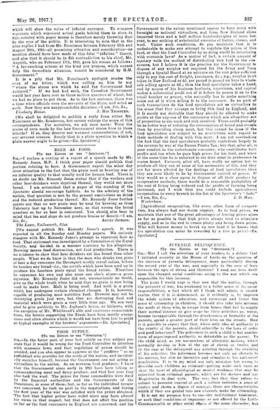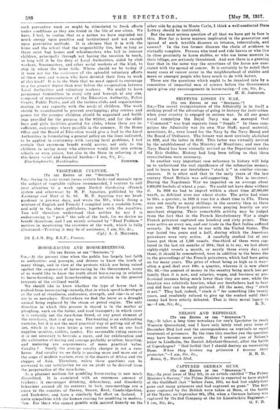JUVENILE DELINQUENCY.
(To MI EDITOR Or THE " SPECTATOR."1 Sia,—May I call the attention of your readers to a debate that I initiated recently in the House of Lords on the question of the increase of juvenile delinquency, more particularly during the second year of the war, and especially in the case of boys 'between the ages of eleven and thirteen? I need not here dwell upon the changed social conditions owing to the war which are responsible for this increase.
The point I would urge is that now that the nation, through the pressure of war, has awakened to a fuller sense of its social responsibilities, a fact which all I think will admit, it should realize that if it is determined, as it evidently is, to improve the whole system of education, and encourage and foster the sense of citizenship in children, it should also take into account the needs of those who, to escape from homes that fail to supply their normal interest or give scope for their activities or, worse, become insupportable through the drunkenness or brutality of the parents, spend a greater part of their lives on the streets. How is it possible to expect that they, whose only idea of authority is the cruelty of the parents, should subscribe to the laws of order and good behaviour? The policeman to such a child is but another form of superimposed authority as detestable as the parent. To the child mind, as yet unconscious of altruistic motives, which normally develop in him at the age -of eleven or twelve, and in the case of the delinquent are arrested through the crushing of his activities, the policeman becomes not only an obstacle to his success, but also an incentive and stimulus to his anti-social proclivities. It is to my mind not only mistaken but wrong to describe such children as criminal—putting aside such cases as show the taint of physiological or mental weakness that may be inherited from criminal parent's, which are for doctors and not .Magistrates to deal with. The very fact that they refuse to submit to parental control of such a nature indicates a sense of 'justice and shows a degree of courage; these are characteristics which if they are guided into new channels make for citizenship.
It is not my purpose here to eon-eder institutional treatment, or such ideal conditions of expansion as are offered by the Little 'Commonwealth or other social efforts of the same character, but such preventive work as might be stimulated to fresh efforts under conditions as they are found in the life of our cities. We have, I feel, to realize that as a nation we have expended too much energy upon punitive and institutional and not enough open preventive methods. It is obvious that it is with the home and the school that the responsibility lies, but so long as there exist bad homes and schoolmasters who fail to interest children, principally through not having the vocation to teach, so long will it be the duty of Local Authorities, aided by club workers, Scoutmasters, and other social workers of the kind, to step in where the home fails. Where should we be to-day if it were not for the assistance of the splendid voluntary efforts of those men and women who have devoted their lives to work of this kind? It is to the State that we must appeal to encourage in a far greater degree than ever before the co-operation between Local Authorities and voluntary workers. We ought to have permanent Committees in every city and borough of any size, composed of representatives ef the Education Authority, Police Courts, Public Parks, and all the various clubs and organizations dealing in any capacity with the needs of children. The work should be co-ordinated to prevent overlapping; play centres and games for the younger children should be organized and build- ings provided for the purpose in the winter, and for the older boys and girls facilities granted for clubs, where these are in- sufficient, and camps where possible in the summer. If the Home Office and the Board of Education would give a lead to the Local Authorities in formulating a general policy on the lines indicated, to be applied in cenformity with varying local problems, I feel certain that enormous benefit would accrue, not only to the children in saving many who otherwise would drift into reform schools or even prison, but also to the State in relieving it of this heavy social and financial burden.—I am, Sir, he.,



























 Previous page
Previous page